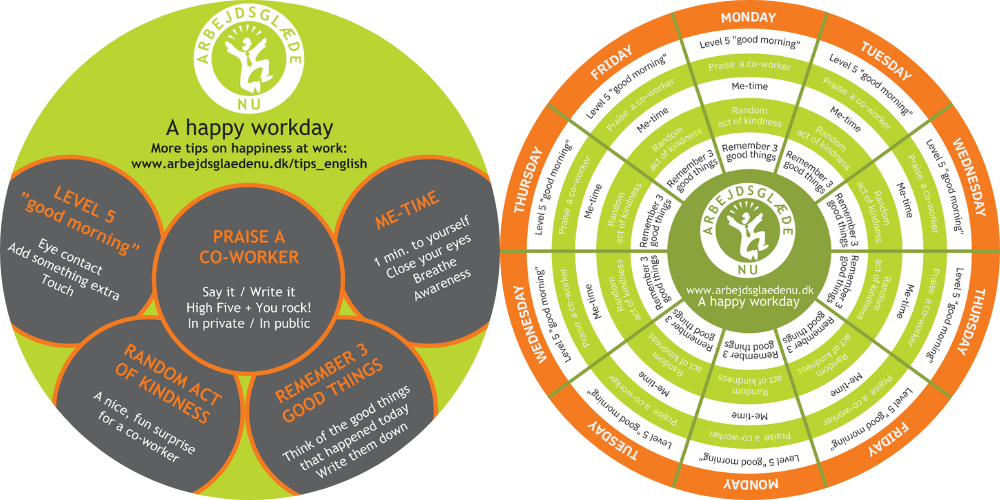5 tips to “arbejdsglæde”
Arbejdsglæde (Happiness at Work) is not so much about what we have – or want, it’s more about what we do. But what makes us happy at work? What do we need to focus on?
Arbejdsglæde comes from doing meaningful work together with good colleagues. Or as we like to simplify it; results and relationships. We can boost our happiness at work by promoting a sense of meaningful work and creating good working relationships.
Happiness at work is an amazing thing – and a crappy job can cause all kinds of problems, from stress and aches to depression and illness. Fortunately, most Danish employees are aware that it obviously is better to be happy on the job, especially because you spend so many hours at work. The companies have also realised, that they only get motivated, efficient and service-minded employees when the employees love their job. Happy companies are more successful.
The big question is obviously: OK, I’m convinced – happiness at work is good. But what do I do? Fortunately, it is not rocket science.
Results and relationships
We love to create results – particularly meaningful results. We go to work to do a good job and have a desire to be proud of our efforts. And it is important for us to have good relationships in the workplace. Working with people we can trust and respect, which also promotes collaboration. The two things together; results and relationships are what give us arbejdsglæde.
And here are 5 very specific things you can do – one of them perhaps already today – to create results and relationships and become more happy at work.

Random acts of kindness
Patricia (our administrative genius) once had a job in a large insurance company where there certainly wasn’t much happiness at work. One night she saw that a colleague’s coffee mug was still unwashed in their kitchen. She quickly grabbed the cup and washed it. Then she took a post-it note and wrote “Have a nice day” and a smiley and put it on the colleague’s cup. The next morning the colleague came through the entire department with the cup, smiling ear to ear while she was happily saying “Who wrote this? It made me so happy! Who was it?” Such a little thing had saved her whole day – maybe her whole week. We love the little thoughtful things that others do for us.
Write a kind personal message to a colleague who has helped you, bring a cup of coffee to a colleague who is extra busy, bring flowers from your garden, put a piece of chocolate at your colleague’s work station, bring home-made cake to your team (just because), hold the door for a colleague, or offer your help to a colleague. Random acts of kindness are small things you do completely unexpectedly to make others happy. We all love when someone is considerate. And then, luckily, science shows that we also become happier ourselves by making others happy. So it’s a win win right there.
Praise
We all need recognition, whether we want to admit it or not. Often we just forget to praise others, even if we intend to. Give your colleagues a pat on the back when they deserve it. Tell them in person, praise them in a meeting, write a small note or card, send an email etc. As long as you remember to give appreciative feedback.
Regardless of the way you choose to praise, it is important to be sincere. You shouldn’t just praise for the sake of praising, but recognize a colleague when that person really earned it. And one of the most important things when praising, is to be specific with what you recognize the person for. Tell what it meant to you, the department, the company, customer/patient or others. And last but not least; be aware that some of us need recognition more often than others. Know your colleagues and be aware of who needs a pat on the back more often.
Say good morning
When you arrive at work, it is important that you greet your colleagues. It sounds trite, but it works! It simply gives a better start to the day, which results in better collaboration for the rest of the day, guaranteed to be much better than if the day starts with being ignored by colleagues. Studies show that the start of the day affects the rest of your day. Furthermore, one of the most important, deepest and most fundamental psychological needs we humans have is for other people to like us. There is nothing more important to us than that we feel seen, respected and cared for. We spend a lot of hours at work, which makes it even more important to have good relationships with your colleagues. Create good relationships by starting the day positively.
Here is the recipe for a good good-morning:
- Say good morning – if you start working in in the evening, of course you say good evening
- Make eye contact
- Sound kind – smile
- Add the person’s name and/or something extra to your “good morning”, like “Good to see you”, “Did you have a good weekend?”, “How’s the assignment you’re working on going?”, “Would you like to have lunch together today?” or similar.
- Touch the other person (shake hands, a pat on the shoulder, if you know the person well maybe even a hug – depending on the mood – and of course with respect for what the other person is ok with).
Studies show that the start of your day has the ability to influence the rest of the day – the mood you set out tends to continue. So you might as well start off happy just in case :-) And also remember a happy “goodbye and see you again” before you go home. It might be you think you don’t have time for it – but the truth is rather that you don’t have time not do it!
Remember 3 good experiences from your day
By consciously focusing on the good things that happen to you, you become happier and more grateful. Studies have shown that a conscious focus on today’s good experiences can make us humans measurably happier!
Before you go home from work, write down 3 good experiences from the workday. It can be little or big things, just something that made you happy. It helps you to better see (and remember) the positive experiences that happen during a working day and trains you to think more positively. Some studies show that if you do this exercise for 2 weeks, you are measurably better at remembering the positive experiences the 3 following months.
Me-time
Have you noticed the way you feel today? Take 1-2 minutes for yourself every day. How to do it: Find an undisturbed place. Sit down comfortably. Close your eyes, breathe, and notice your breathing for 60 seconds. Is it fast or slow? Deep or light? Ask yourself: how do I feel physically? Is there anything uncomfortable? Do I have any pain? Am I energetic or tired? What fills your thoughts? Are you happy, excited, nervous, expectant, or something else? Do you have arbejdsglæde – or not… Think about what you have to do. Maybe more of what makes you happy, or do something about what challenges your arbejdsglæde. Sit quietly and breathe for another minute, then open your eyes and go back to work.
If you discover something is ruining your happiness at work, do something about it, or get hold of someone who can help you do something about it. Don’t wait for your colleagues, your boss or the company to know what’s wrong. Only you know what makes you happy at work. So speak up and do something!
Arbejdsglæde is something we do!
Whether you are the CEO or the gatekeeper, you can make a difference. As long as we sit and wait for colleagues, our boss, the company or society to come and make us happy, absolutely nothing happens.
Because only you know what makes you happy! It is not up to others to read your thoughts and guess whether you are happy or not. It is your job to speak up. And to do something about it!
Monday tips
You can find more inspiration in our Monday tips – which are simple things you can do to create more happiness at work. There is a new tip on our blog almost every other (surprise!) Monday. Unfortunately our blog is in Danish only.

